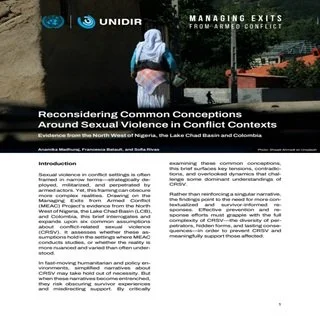By Anamika Madhuraj, Francesca Batault, and Sofia Rivas
Sexual violence in conflict settings is often framed in narrow terms—strategically deployed, militarized, and perpetrated by armed actors. Yet, this framing can obscure more complex realities. Drawing on the Managing Exits from Armed Conflict (MEAC) Project’s evidence from the North West of Nigeria, the Lake Chad Basin (LCB), and Colombia, this brief interrogates and expands upon six common assumptions about conflict-related sexual violence (CRSV). It assesses whether these assumptions hold in the settings where MEAC conducts studies, or whether the reality is more nuanced and varied than often understood. In fast-moving humanitarian and policy environments, simplified narratives about CRSV may take hold out of necessity. But when these narratives become entrenched, they risk obscuring survivor experiences and misdirecting support. By critically examining these common conceptions, this brief surfaces key tensions, contradictions, and overlooked dynamics that challenge some dominant understandings of CRSV. Rather than reinforcing a singular narrative, the findings point to the need for more contextualized and survivor-informed responses. Effective prevention and response efforts must grapple with the full complexity of CRSV—the diversity of perpetrators, hidden forms, and lasting consequences—in order to prevent CRSV and meaningfully support those affected.
Geneva, SWIT: United Nations Institute for Disarmament Research UNIDIR, 2025. 25p.



